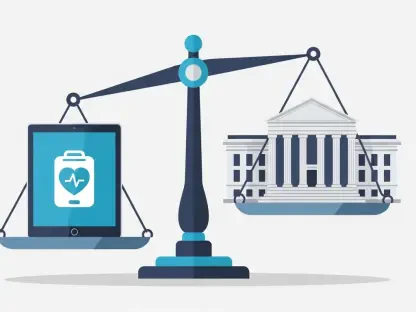Recent developments have highlighted the growing concern over digital privacy, especially concerning sensitive areas such as reproductive health. Representative Sara Jacobs has reintroduced the “My Body, My Data” Act in response to these concerns, emphasizing the need for stringent measures to safeguard personal data within reproductive health services. This legislative initiative seeks to protect individuals’ privacy by implementing regulations that control the data collection and sharing practices of various digital platforms, including period tracking apps and fertility services. The act addresses these concerns by setting legal frameworks designed to protect users’ personal information while ensuring continued access to essential healthcare services.
The Principles and Provisions of the Act
Rigorous Data Management Standards
Within the scope of the act, companies handling reproductive health data must adhere to strict data management practices, ensuring that personal information is only collected and used as necessary for providing specific services. These rigorous standards serve to minimize the risk of unauthorized data exposure or misuse, thereby bolstering users’ confidence in sharing sensitive information. Businesses are mandated to make the purpose of data collection transparent, implementing limitations on how data is retained and with whom it may be disclosed. Such a commitment to data integrity ensures that intrinsic trust is maintained between consumers and service providers in the digital realm.
Furthermore, the act provides individuals with definitive rights to manage their own data, which includes accessing and deleting their information when needed. This empowerment is key in setting a new precedent for data privacy, allowing users more control over their personal health data. Publishers of digital platforms are required to establish and maintain clear privacy policies, offering transparency and choice to their users. By establishing a robust framework for privacy, the act not only motivates ethical practices among data processors but also fosters a safer digital ecosystem for all users concerned with their reproductive health privacy.
Enforcement and Accountability Mechanisms
To ensure proper adherence to these privacy regulations, the act designates the Federal Trade Commission (FTC) as a primary oversight body. This agency is empowered to hold companies accountable to their publicly declared privacy commitments, promoting transparency and protecting user interests. The FTC’s role is crucial in providing an external check on companies’ compliance, thereby establishing a system that discourages potential violations and encourages responsible marketing practices. Such a federal oversight mechanism ensures that companies prioritize privacy and user consent in their operational framework.
In cases where privacy regulations are breached, the act authorizes individuals with a private right of action, granting them the ability to sue for damages or injunctions. This provision extends additional protections to consumers, reinforcing their autonomy and securing their right to seek redress in the event of privacy violations. Through such comprehensive enforcement and accountability structures, the act demonstrates a commitment to instilling a culture of respect for user privacy, advocating for the ideals of digital agency and empowerment in reproductive health data management. This commitment amplifies the voice of the consumer, holding businesses accountable and ensuring that privacy infringement is not marginally addressed but actively deterred.
Flexibility and National Standards
Interrelation Between State and Federal Laws
A distinctive feature of this legislation is its flexibility, which permits states to enhance protective measures even further, beyond the federal provisions. While establishing a national privacy standard, the act allows regional nuances by letting individual states introduce or maintain stricter laws if deemed necessary. This dual-tiered approach is pivotal in achieving comprehensive protection, recognizing that states may have unique needs and circumstances that require augmented measures. With varying demographics and healthcare landscapes, states are equipped to tailor their privacy laws accordingly, thereby providing a more responsive legal structure.
Support from key organizations, such as Planned Parenthood and the National Women’s Law Center, underscores the significance of this collaboration between state and federal levels. These organizations play a crucial role in advocating for and safeguarding reproductive rights, providing essential educational resources and legal support. This support facilitates the adoption and effective implementation of privacy laws across the country. Engaging both federal and state jurisdictions promotes an adaptable and inclusive framework that reflects the broader societal commitment to protecting reproductive health privacy, ensuring alignment in policy execution.
Technological and Legislative Implications
The passage of this act signals a commitment to adapting privacy standards amidst a rapidly evolving digital landscape. It acknowledges the transformative power technology holds on reproductive health, spanning from mobile applications to advanced telehealth services. With technology’s growing role, legislative efforts like this seek to bridge gaps, ensuring innovation does not come at the cost of user privacy. Constant advancements in technology require equally dynamic responses from policymakers; thus, the act stands as a critical response toward safeguarding personal information despite advancements that might pose new privacy threats.
This approach not only modifies existing protocols but encourages continuous improvement in how user privacy is integrated within technology development. Companies are urged to innovate with privacy at the forefront, promoting a culture of digital responsibility and ethical tech practices. By instilling such values, the legislation paves the way for a future where healthcare technologies operate transparently, efficiently, and, crucially, with the utmost respect for user privacy, reinforcing trust in digital health solutions and fostering further innovation in the sector.
The Future of Reproductive Health Privacy Protections
Recent advancements have spotlighted the increasing concerns surrounding digital privacy, with a particular focus on sensitive domains such as reproductive health. In light of these issues, Representative Sara Jacobs has once again introduced the “My Body, My Data” Act, aiming to enforce measures that safeguard personal information within reproductive health services. This legislative effort is dedicated to shielding individuals’ privacy by establishing regulations to govern the data collection and sharing activities of various digital platforms, including apps that track menstrual cycles and services related to fertility treatment. By setting legal standards, the act seeks to ensure the protection of users’ sensitive information while preserving access to vital healthcare services. The initiative emphasizes the balance between privacy and accessibility, recognizing the critical nature of both in today’s digital age, where data protection and reproductive health empowerment are increasingly intertwined.









